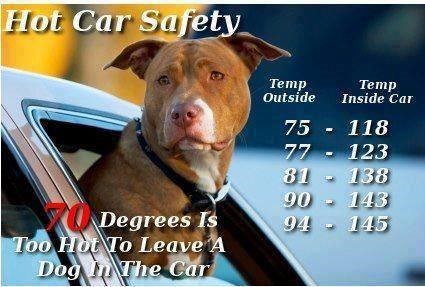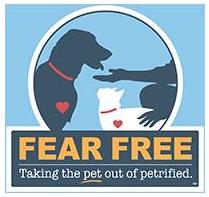 June 2016 – Preventing Pet Heat Stroke
June 2016 – Preventing Pet Heat Stroke
As outdoor temperatures increase, the risk of pet heat stroke increases. Just like humans, your dog, cat, or small pet can succumb to heat stroke when his/her body temperature rises excessively. The normal body temperature for a dog or cat is about 101.5°F. At 105 degrees Fahrenheit or higher, their furry bodies simply cannot sweat to dissipate the heat. Panting and breathing rapidly can only help so much before their bodies enter the danger zone leading to seizures, organ failure and blood clotting complications. Heat stroke is therefore a medical emergency and requires veterinary treatment.
Common causes of heat stroke in pets
- Leaving a pet in a locked car unattended – Cracking the window is not a sufficient way to keep the interior of a car cool enough to be safe. Here’s a handy chart that tells you just what the temperature difference is inside a car versus the outside air temperature. Simply leave your pet at home.
 credit Facebook/Pet Poison Helpline
credit Facebook/Pet Poison Helpline
- Over exercise outdoors on hot and humid days – Certain breeds of dogs such as Pekingese, pugs, Lhasa apsos and Boston terriers (those with short noses) are predisposed to heat stroke. Overweight or obese pets and those with airway problems cannot handle the heat very well. Asking your pet to run or play in hot, humid weather might lead to heat exhaustion or stroke.


- Accidentally being trapped in a hot, enclosed space – It is not unheard of that a cat sneaks into a hot attic, garage, or even a car and goes unnoticed until it’s too late. Keep close tabs on your felines during hot weather and make sure all pets are accounted for when the temperatures sour.
- Pets kept in outdoor enclosures – For those with pet rabbits kept in outdoor hutches, for example, it’s important to know that bunnies are more susceptible to heat stroke from temperatures greater than 85 degrees F. You should roll or move their hutch into a cool garage or under a tree for shade when the temperature climbs. Also, place a frozen plastic milk jug inside their hutch. While the jug slowly thaws, it will keep your rabbit cooler.
- Don’t overlook indoor temperatures – Keeping pets comfortable and healthy inside your home can be just as important as outdoor situations. Guinea Pigs, for example, should be kept in a quiet area out of direct sunlight. The recommended room temperature is 65-79 degrees F. They do better in cooler temperatures rather than in too much heat and humidity. Like rabbits, they can get heat stroke at temperatures over 85 degrees F. All pets need access to clean, fresh water at all times, indoor or outside.

Signs and symptoms of heat stroke
Dogs and cats suffering from heat stroke will first demonstrate excessive panting, salivating, difficulty in breathing, and discomfort. As symptoms progress, they may vomit or have diarrhea, become noticeably disoriented or even begin to have seizures. If not promptly treated, this can lead to loss of consciousness and even death.
Emergency first aid and veterinary treatment
To save a pet suffering from heat stroke, take first aid measures immediately by placing cool, wet towels over the back of the pet’s neck, in the armpits and in the groin region. You may also wet the earflaps and paws with cool water. Then quickly transport him/her to the closest veterinary facility for emergency treatment. Many of the complications from heat stroke do not begin to appear until several days after the incident, and prompt veterinary care can potentially prevent or treat some of these complications and save your pet’s life.
Be sure to keep a list of 24-hour emergency care facilities on hand so you know just where to go if an incident occurs. As always, be safe, not sorry.
Recommended Reading:
AVMA Pet Care – Hot Cars and Loose Pets
House Rabbit Society – Rabbits and Warm Weather Concerns
VeterinaryPartner.com – Hyperthermia First Aid (Heat Stroke)
Guinea Pig facts and basic husbandry
How to keep your pet rabbit healthy in an outdoor environment
Belle Mead Animal Hospital, Your Other Family Doctors
LIKE us on Facebook, Follow us on Twitter @BMAH121 and Join our Circle at Google+ for news and pet wellness tips. We’re now on Pinterest!









